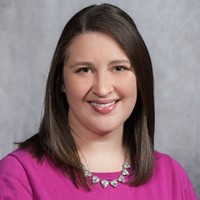By Laura Checovich
May 20, 2020
Failing a required class may feel like the end of the line for high school students, but it’s not. Many high schools offer ways for students to recover credits and stay on track to graduate. Such credit recovery courses can take many forms, from repeating an entire course in person to retaking a single unit online.
The Regional Educational Laboratory (REL) Midwest teamed up with the Minnesota Department of Education (MDE) to improve credit recovery practices, ensure students have equitable access to quality options, and ultimately, increase high school graduation rates. In 2018, a REL Midwest team, led by researcher Dominique Bradley, Ph.D., provided a series of coaching sessions to assist MDE in conducting a scan of credit recovery programs to identify action steps for improving statewide practices.
Through the scan, MDE and REL Midwest identified that schools in Minnesota were struggling to offer equitable and high-quality credit recovery options. In addition, schools needed support to effectively integrate competency-based education, which allows students to learn and advance at their own pace.
As a result of the scan, the REL Midwest and MDE team, along with other stakeholders, formed a networked improvement community (NIC) of Minnesota alternative learning centers (ALCs). These centers provide comprehensive education services, including credit recovery, to middle and high school students who are off track for graduation. The network’s goal is to use a continuous improvement process to strengthen competency-based credit recovery practices in the state.
Plan, do, study, act
|
The Minnesota ALC NIC includes eight teacher teams from Anoka-Hennepin Technical High School, Guadalupe Alternative Programs (GAP) School, PYC Arts & Tech High School, and Robbinsdale Academy Highview. Through the NIC, the teams collaborate and conduct fast-turnaround research activities to develop, implement, test, and refine competency-based credit recovery practices. These activities follow a continuous cycle of improvement, often referred to as a Plan-Do-Study-Act (PDSA) cycle. |
|
The NIC teams meet with REL Midwest coaches virtually on a periodic basis and in person quarterly to share their work and brainstorm ideas. Over the course of a year, the teams identified a change idea on which to focus—a student goal-setting strategy—and performed PDSA cycles to develop, implement, test, and refine the strategy.
Change idea: Goal-setting
If we support students in developing the habits of goal-setting and reflection through practicing regular goal-setting, on-track/off-track exit tickets, and end-of-cycle reflections, then students will be more likely to complete their courses, be awarded credits, and graduate.
To start a PDSA cycle, each team plans its implementation of the goal-setting strategy and predicts how it will influence students. Next, the teams do, or implement, the strategy and collect data on both the implementation and students’ success in goal-setting and reflection.
After completing the Plan and Do stages, the teams regroup to study what has occurred so far in the cycle. Teams compare their results to their initial predictions and reflect on what they have learned. Finally, the teams act by deciding which parts of their implementation they should adapt, adopt, or abandon as they roll into the next PDSA cycle.
In reflecting on the PDSA cycles, Regina Edmisten of the GAP School shared that “it’s going to be a process. It’s not going to happen in the first trial or even the second trial. It might take us the rest of the year to get some really good ideas. It’s funny because you want to do it right, you want to do a good job, but in the day to day, you don’t always realize what’s happening until you look at it from a different angle.”
Adapting to a new normal
Sometimes, there are unexpected challenges. In March 2020, the NIC members and their students, along with people across the country and around the world, suddenly found themselves at home under shelter-in-place orders related to the COVID-19 pandemic.
Minnesota ALC NIC members did not let the need to shift to remote learning keep them from continuing with their goal-setting strategy. Even though the NIC has completed sessions for the year, many NIC members continue to support students in using the goal-setting strategy in a remote learning environment. In addition, all four ALCs are planning to continue their work into 2021 and participate in a train-the-trainer workgroup so they can learn how to scale up the PDSA framework to other teachers in their schools.
Upcoming REL Midwest resources
In 2020, REL Midwest will create the following resources related to the Minnesota ALC NIC:
- Video: REL Midwest is producing a short video about the work of the Minnesota ALC NIC. The video will share the stories of teachers and administrators participating in the NIC and what it’s like to go through a continuous improvement cycle. REL Midwest researchers will also describe the impact this approach can have. Look for the video on our website this summer!
- Documentary: In collaboration with Twin Cities Public Television, REL Midwest is developing a documentary highlighting students, educators, families, and communities around Minnesota in a documentary on positive school climate, constructive academic and social habits, trust between students and staff, and the implementation of social and emotional learning practices. The documentary is slated to air in late 2020.
Learn more
Read this October 2019 blog post to learn more about the credit recovery scan REL Midwest and MDE conducted and what they found. Then explore the coaching materials REL Midwest used to support MDE in conducting the scan as well as an infographic highlighting the results.
Interested in learning more about competency-based education? See our related blog post for research and resources on the topic from across the REL network, including REL Midwest’s recent webinar, Implementing Competency-Based Education Strategies: From Research to Practice.
Gallery of the Minnesota Alternative Learning Centers NIC in action
|
|
|
|
|
|






